
Biology, 12.10.2020 20:01 Michcardwell1071
A scientist investigated DNA replication in two groups of cells, labeled A and B. She injected radioactively labeled nucleotides into cells of each group and allowed DNA replication to begin. When replication was halfway completed, she injected a drug into the cells to stop replication. She then examined the cells to determine the distribution of the newly-synthesized DNA. She found each cell of group A had many segments of new DNA in its nucleus, while each cell of group B had a single segment of new DNA in its cytoplasm.
What can the researcher conclude about the cells?
A. Group A cells are prokaryotic because they must have many origins of replication.
B. The cells in group A are eukaryotic because they replicate their DNA in the cytoplasm or nucleus.
C. Group B cells are eukaryotic because they must have a single origin of replication.
D. The cells in group B are prokaryotic because they replicate their DNA in the cytoplasm.
D. The cells in group B are prokaryotic because they replicate their DNA in the cytoplasm.
I hope this helps.


Answers: 2


Another question on Biology

Biology, 21.06.2019 22:00
Consider darwin's first writings on the theory of natural selection. an important point of darwin's essay on the principle of population, written in 1798, was a peer's observation that in nature plants and animals produce far more offspring than can survive, this observation can be attributed to a) charles lyell. b) thomas malthus. c) jean-baptiste lamarck. d) johann friedrich meckel.
Answers: 2

Biology, 22.06.2019 02:30
Which list is in order from simplest to most complex? a bacteria - virus - plant - protist b protist - bacteria - virus - plant c virus - bacteria - plant - protist d virus - bacteria - protist - plant
Answers: 2

Biology, 22.06.2019 07:00
According the inverse square law, doubling the distance from the source of the sound, a speaker, for example, will drop the sound 6 db each time. if you were standing in the back of an auditorium, 32 feet away from a speaker not using any amplification, would you be able to hear a speaker clearly? why or why not?
Answers: 2

Biology, 22.06.2019 13:20
Where is the nictitating membrane found? a. between the eyelid and the eyeball b. between the retina and the optic nerve c. between the outer and middle ear d. in the organ of corti in the middle ear
Answers: 2
You know the right answer?
A scientist investigated DNA replication in two groups of cells, labeled A and B. She injected radio...
Questions

Mathematics, 26.01.2021 21:10

Biology, 26.01.2021 21:10


Geography, 26.01.2021 21:10


Social Studies, 26.01.2021 21:10







Mathematics, 26.01.2021 21:10



Mathematics, 26.01.2021 21:10




Computers and Technology, 26.01.2021 21:10



